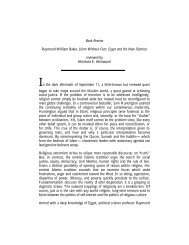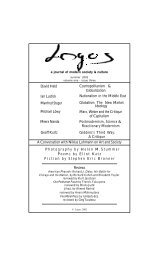Michael J. Thompson Stephen Eric Bronner Wadood Hamad - Logos
Michael J. Thompson Stephen Eric Bronner Wadood Hamad - Logos
Michael J. Thompson Stephen Eric Bronner Wadood Hamad - Logos
Create successful ePaper yourself
Turn your PDF publications into a flip-book with our unique Google optimized e-Paper software.
Stanley Aronowitz<br />
underlying presuppositions of theorizing. Marxists criticize the lack, even<br />
disdain of “class analysis” in his work; indeed the commentaries in his<br />
collection of annotated readings, The Marxists constitute both an appreciation<br />
and an unsystematic critique of Marx and Marxism. And social historians,<br />
most of them informed by class and class struggle, object to his focus on the<br />
study of élites rather than popular expressions from below, even within social<br />
movements.<br />
Yet Mills remains a model for those who wish to become intellectuals: by the<br />
evidence of his massive output in the twenty-three years of publications he was<br />
the antithesis of the specialist or the expert. When most in the human sciences<br />
followed the path of least resistance by writing the same articles and books<br />
over and over, Mills ranged widely over historical cultural, political, social, and<br />
psychological domains. He was interested in the labor and radical movements<br />
and wrote extensively on them; as a close student of Max Weber he made<br />
some of the most trenchant critiques of bureaucracy; he was among the leading<br />
post-war critics of the emergent mass culture and the mass communications<br />
media and, despite its ostensibly introductory tone, The Sociological<br />
Imagination may be America’s best contribution to the ongoing debate about<br />
the relationship of scholarship to social commitment, a debate which has<br />
animated literary as well as social science circles for decades.<br />
His literary executor and biographer, Irving Louis Horowitz, turned against<br />
him, for the most part, so the biography tells us more about the author than<br />
about Mills. Other book-length treatments are sympathetic but limited, and<br />
to a large extent, dated. With the partial exception of some excellent<br />
dissertations and master’s theses, notably Tom Hayden’s insightful Radical<br />
Nomad more than forty years after his death, Mills awaits a major critical<br />
study, let alone a full-length biography.<br />
We may speculate that among putative readers his contemporanity, the sharp<br />
focus on the United States and its traditions and, most of all, his annoying<br />
habit of writing plainly (substituting vernacular expressions for scientific terms)<br />
turned away some who can only respect writers who invent neologisms and<br />
whose simple thoughts require complex syntax. But at a moment when these<br />
fashions have lost some of their luster, those who yearn for substance as well as<br />
style may return with pleasure to the dark ruminations of C. Wright Mills.<br />
<strong>Logos</strong> 2.3 – Summer 2003




